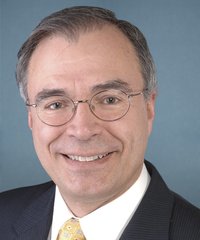
The son of immigrants who fled communist Eastern Europe immediately after World War II, Dr. Andy Harris was as a physician at the Johns Hopkins Hospital, a medical officer in the Naval Reserve, and a state senator before coming to Congress.
Born in Brooklyn in 1957, he studied medicine at Hopkins, where he continued to practice as an anesthesiologist for nearly three decades. Andy specialized in obstetric anesthesiology.
In 1988, Andy answered a recruitment call to fill a critical need for anesthesiologists in the Naval Reserve during the Reagan administration. He went on to establish and command The Johns Hopkins Medical Naval Reserve Unit. In 1990, his unit was called up to active duty in order to assist with Operation Desert Shield (and later Operation Desert Storm) at Bethesda Naval Hospital. Harris attained the rank of Commander (O-5) before leaving the Reserves after seventeen years.
As a physician and Member of Congress, many of my constituents have contacted me with concerns about COVID-19, more commonly referred to as the Coronavirus. More information can be found below on the government wide response.
On April 23, 2020, the House of Representatives passed H.R. 266 the Payroll Protection Program Increase and Health Care Enhancement Act. This legislative package was crafted to further support small businesses and the healthcare sector. Below are the bill’s major provisions, as well as an update on direct stimulus payments:
Small Business Loans: H.R. 266 adds another $310 billion worth of funding for the Small Business Administration’s (SBA) Paycheck Protection Program after its funding was depleted in mid-April. $60 million of this funding will be set aside for small lenders in an effort to serve businesses in underbanked communities. More information on this program can be found in the following link:
H.R. 266 provides another $50 billion for SBA’s disaster loan programs and another $10 billion for the Emergency Economic Injury Disaster Loan (EIDL) grant program. This bill also expands access to the EIDL program to small farms. More information on EIDL loans be found in the link below:
Hospitals and Test Funding: H.R. 266 provides $75 billion worth of funding for the Department of Health and Human Services' Public Health Social Services Emergency Fund. These funds will be used to help hospitals and healthcare facilities treat coronavirus patients. H.R. 266 also provides $25 billion in funding for coronavirus testing and testing research. These funds will be split between the states and the federal government to help develop and produce more coronavirus tests.
Update on Individual Rebate Payments:
As you may know, the CARES Act included a provision for individual rebate payments to those who qualify. For most Americans, including Social Security recipients, no action on their part will be required to receive a payment since the Internal Revenue Service (IRS) will use their 2019 tax filing, or their 2018 tax filing if they haven’t filed for 2019, to determine their eligibility. More information on eligibility can be found in the link below:
https://www.irs.gov/coronavirus/get-my-payment-frequently-asked-questions#elig
If an individual has provided direct deposit information to the IRS, their payment will be deposited automatically. If not, the IRS will mail a check to the address used on their last tax return. Direct deposit payments have already started, and they are projected to be completed by the end of April. It is predicted that mailed rebate checks will be sent throughout the month of May. It is important to note that these payments will not be taxed.
If you have not filed your 2018 or 2019 taxes, the best way to ensure you receive a recovery rebate is to file a 2019 tax return. This can be accomplished for free, online, using the IRS Free File program (https://www.irs.gov/filing/free-file-do-your-federal-taxes-for-free). The IRS has announced that Social Security beneficiaries, who are not typically required to file tax returns, will not need to file an abbreviated tax return in order to receive a payment. The IRS is also working on a web-based portal where taxpayers can update their direct deposit information and check the status of their rebate. More information on this can be found in the following link: https://www.irs.gov/coronavirus/get-my-payment.
Additionally, more detailed information on travel advisories, state level actions, Centers for Disease Control and Prevention (CDC) recommendations, assistance to small businesses, unemployment assistance, and restrictions on foreign entry, can be found at the links below: